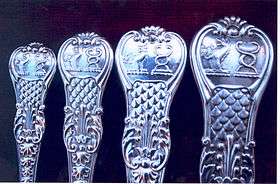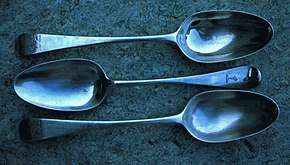Silver spoon

The English language expression silver spoon is synonymous with wealth, especially inherited wealth; someone born into a wealthy family is said to have "been born with a silver spoon in his mouth". As an adjective, "silver spoon" describes someone who has a prosperous background or is of a well-to-do family environment, often with the connotation that the person does not appreciate or deserve his or her advantage, its having been inherited rather than earned.
Historical uses
Before the place setting became popular around 1700, people brought their own spoons to the table, carrying them in the same way that people today carry wallet and keys. In pre-modern times, ownership of a silver spoon was an indication of social class, denoting membership in the land-owning classes. In the Middle Ages, when farmers and craftsmen worked long hours and frequently got dirt under their fingernails, it was important to not be mistaken for a serf or escaped slave. Under these circumstances, a silver spoon served the functional equivalent of passport, driving licence, and credit card. Since most members of the land-owning classes were smallhold farmers and craftsmen, the silver spoon was primarily a lower-middle-class cultural marker.
Silver spoons, because of their weight and number, were often among the most valuable tangible assets of a middle-class household, and therefore, a traditional target for burglars. For example, in the feature film Far and Away (1992), the character Shannon plans to pay for her emigration from Ireland to the United States with spoons she stole from her wealthy landowner parents.
Beyond their value and aesthetics, silver utensils self-sanitize: silver has antimicrobial properties, due to the oligodynamic effect.
Silver spoons have also been used to detect poison, particularly in the Korean Joseon Dynasty: due to its reactivity, silver tarnishes on contact with sulfur, thus detecting the presence of arsenic sulfides and warning of arsenic poisoning.[1]
A late 18th century silver spoon can still be regularly bought for less than £10, but the sale of the Benson Collection at Christies in June 2013 saw many spoons make high five figure sums, with the top price for a single spoon being £91,000 for a spoon dating from circa 1440.[2]
Cultural references

In literature
The phrase "born with a silver spoon in his mouth" appeared in print in English as early as 1719, in Peter Anthony Motteux's translation of the novel Don Quixote: "Mum, Teresa, quoth Sancho, 'tis not all Gold that glisters [sic], and every Man was not born with a Silver Spoon in his Mouth."[3] Because the phrase is used as a translation of a Spanish proverb with a different literal meaning ("muchas veces donde hay estacas no hay tocinos," literally: "often where there are hooks [for hanging hams] there are no hams"), it seems that the phrase was already considered proverbial in English at the time.
The phrase next appears in a book of Scottish proverbs published in 1721, in the form "Every Man is no born with a Silver Spoon in his Mouth."[4]
John Galsworthy's novel, The Forsyte Saga (1922), contains a chapter called "The Silver Spoon", which refers to a cockered heiress, Fleur Forsyte.
The Italian cookbook Il cucchiaio d'argento (1950) translates to "The Silver Spoon" and uses that title in its English edition; the title is, according to the introduction to the Phaidon Press printing, derived from the English expression.
In music
The term, or parodies thereof, have frequently made their way into popular music. For example:
- The lyrics to Harry Chapin's song "Cat's in the Cradle" (1974) say: "…And the cats in the cradle and the silver spoon…"
- Creedence Clearwater Revival's song "Fortunate Son" (1969) includes the lyrics, "Some folks were born silver spoon in hand."
- The lyrics from the 1985 song, "The Wolf by Heart", start with: "You were born to privilege, lickin' on a silver spoon."
- The lyrics to the Beatles song, "She Came in Through the Bathroom Window" (1969), say, "She came in through the bathroom window, protected by her silver spoon," meaning the girl would have no trouble being naughty.
- In the song lyrics for "Just Like Greta" (2005), Van Morrison says: "Then sometimes it feels so easy, like I was born with a silver spoon".
- "This is Music" (1995), by The Verve, features the lyrics: "I stand accused just like you, for being born without a silver spoon."
- The Who's song "Substitute" (1966) parodies this term with the lyrics, "I was born with a plastic spoon in my mouth", by purposefully inverting the phrase, to refer to being born into poverty.
- Yoko Ono mourns the loss of her "silver spoon" in the song "Mrs. Lennon" (1971), "Silver spoon, o' silver spoon, I lost my silver spoon."
- The Nails' song "88 Lines About 44 Women" (1982) contains the lyrics "Jackie was a rich punk rocker, silver spoon and a paper plate."
- Bob Dylan's song "It's Alright, Ma" contains the lyrics "Darkness at the break of noon shadows even the silver spoon"; the phrase implies that the impending darkness (and the things it represents) does not spare even the wealthy and privileged.
- Bangtan Boys's song "Silver Spoon"
However, some modern uses of the phrase relate to drug use rather than privilege. For example:
- One line of the Eagles' song "Witchy Woman" (1972) is: "And she drove herself to madness with a silver spoon." This usage of the term may refer to the use of a silver spoon for cocaine or absinthe.
- The first few lines from the song "Gold Dust Woman" (1977), by Fleetwood Mac, are, "Rock on, gold dust woman/Take your silver spoon/And dig your grave", relating to Stevie Nicks' use of cocaine.
In musicals
In manga
- The 2011 manga Silver Spoon is based on the premise of a fictional agricultural high school in Japan with a silver spoon over its dining hall entrance, playing with the western definition of silver spoon: the farmers believed they were the ones born rich as they will never have to fear starvation since they control the means of production.
Variants
There are similar expressions in other languages. For example, in Portuguese and Spanish, an expression translated as "born in a gold cradle" is fiduciary to the English, "born with a silver spoon".
The term "gold spoon" is much less commonly used, but finds occasional use, such as the 1840 American Gold Spoon Oration criticizing then-president Martin Van Buren for his supposedly luxurious lifestyle. In some languages, like Swedish and Finnish, the common expression is gold spoon rather than silver spoon, although both can be used.
"Silver fork novels" are described by English professor Paola Brunetti to her husband Guido, in Donna Leon's fourth Commissario Guido Brunetti novel Death and Judgment aka A Venetian Reckoning (1995), chapter 22, as "books written in the eighteenth century, when all that money pored into England from the colonies, and the fat wives of Yorkshire weavers had to be taught which fork to use."[5]
In Australia the expression "silvertail" is also used, with nearly identical meaning. It has been used in cultural or political situations to describe someone as aristocratic or out of touch with the common people.
In the United States, to say that someone "was born on third base but thinks he hit a triple" conveys a similar meaning but makes the undeserving/unappreciated aspect denotatively explicit. It describes someone who acts as if their inherited wealth were earned, or acts as if an earned portion of it weren't built using inherited advantages, such as available business capital from lenders or investors eager to curry favor with the family or to invest in a venture that the family is likely to bail out if it flounders, or parents' networking connections or called-in favors.
See also
References
- ↑ "Spoons and Chopsticks". buddhapia.com. Archived from the original on 2011-05-25.
- ↑ "Silver Spoon". silverspoononline.com.
- ↑ de Cervantes Saavedra, Miguel & Motteaux, Peter Anthony (Translator) (1719). The History of the Renowned Don Quixote de la Mancha, In Four Volumes. 4. p. 345.
- ↑ Kelly, James (1721). A complete collection of Scottish proverbs: explained and made intelligible. p. 101.
- ↑ Leon, Donna (June 1995). Death and Judgment (1st ed.). Harpercollins. ISBN 978-0060177966.